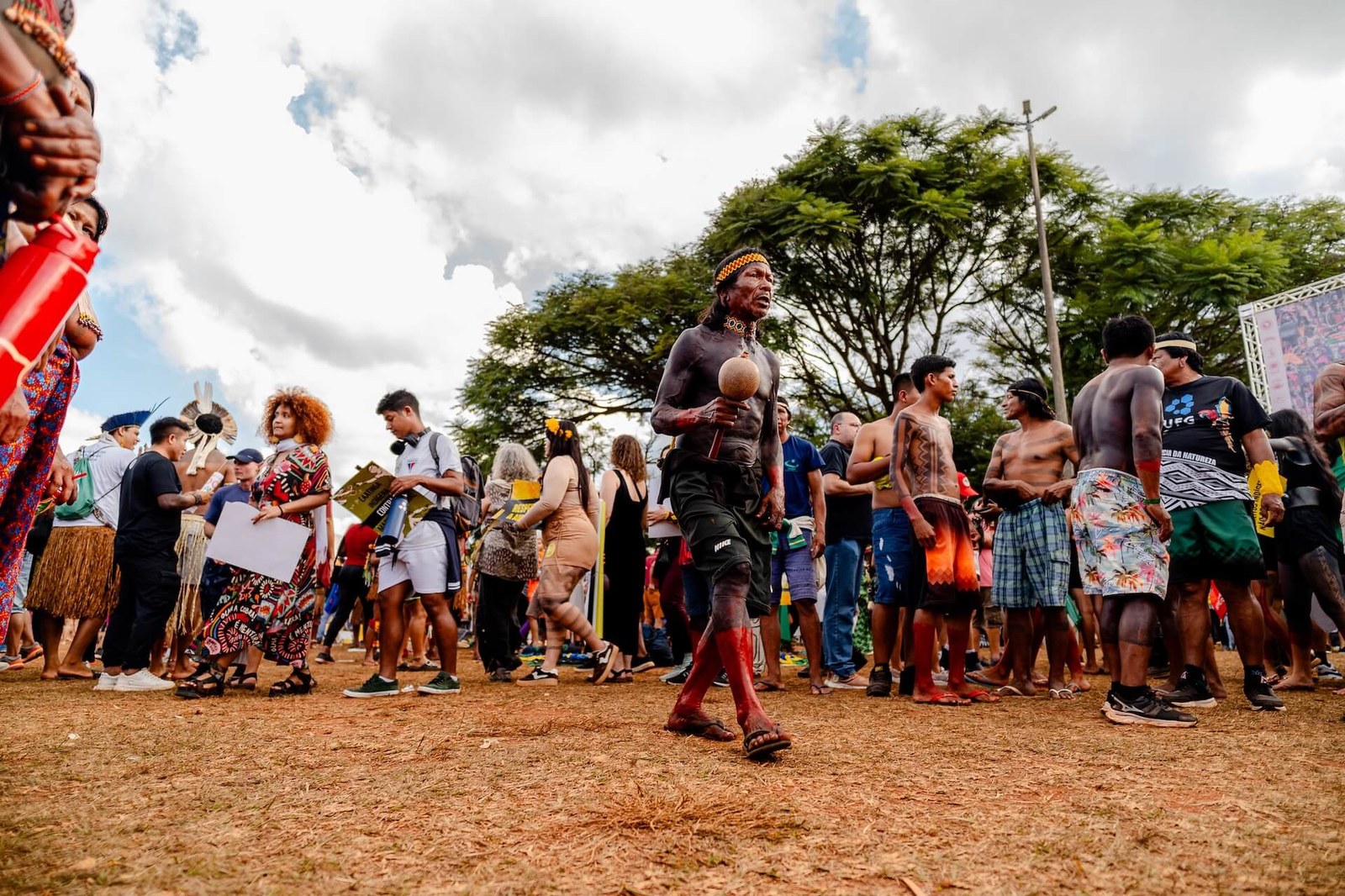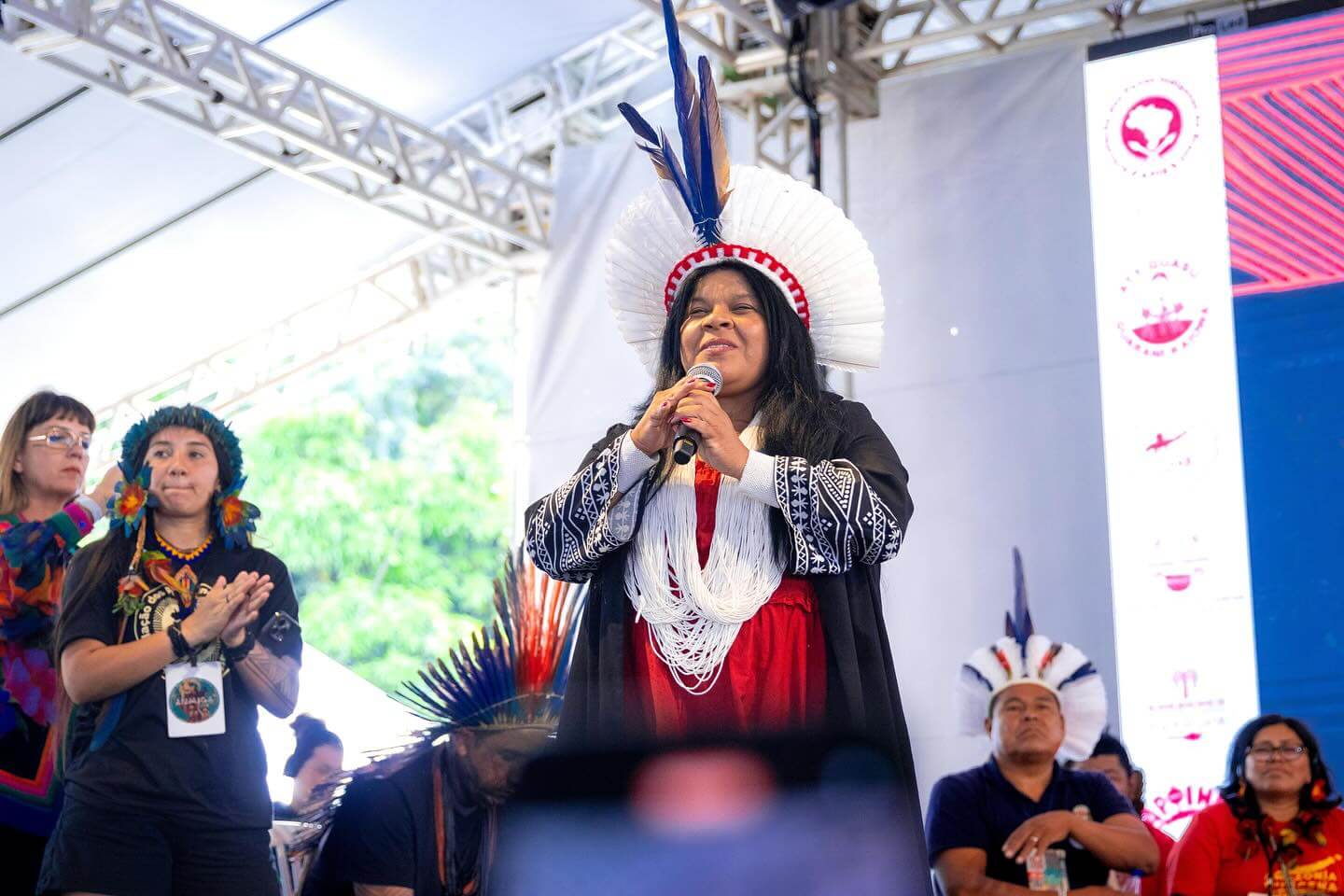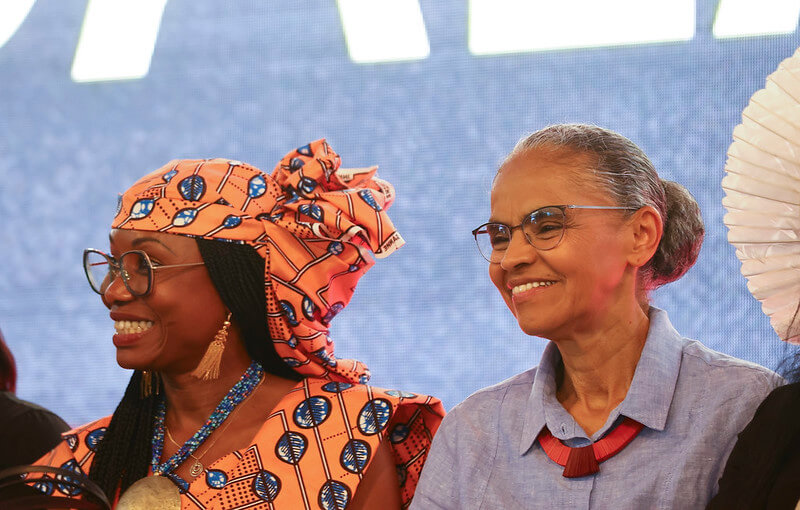COP30 will showcase indigenous territories as part of the fight against the climate crisis
Launched by Brazilian COP30 presidency, with the Ministry of Environment and Climate Change (Ministério do Meio Ambiente e Mudança do Clima/MMA), launched the Indigenous Peoples' Circle to encourage the leadership of indigenous peoples on this issue. The event took place during the Acampamento Terra Livre (Terra Livre Camp).

By Mayara Souto | mayara.souto@presidencia.gov.br
On April 10 (Thursday), the Brazilian COP30 Presidency and the Ministry of Environment and Climate Change (Ministério do Meio Ambiente e Mudança do Clima/MMA) launched the Indigenous Peoples' Circle in Acampamento Terra Livre, in Brasília―the largest indigenous mobilization in Brasil, gathering several ethnic groups from nearby countries. This was the first circle launched by the Brazilian Presidency, that will launch another key area of the event.
"The Indigenous Peoples' Circle is fundamental in order to have a direct link between the COP Presidency and the Indigenous Peoples. So I want to say that the doors of the COP presidency and the Brazilian government are absolutely open to them so that we can make this COP the first where they play the leading role in leading the fight against climate change," said Ana Toni, CEO and Executive Director of COP30.
COP 30 President, Ambassador André Corrêa do Lago, summed up the event. "It is an immensely emotional feeling to be here with you. You give Brasil a dimension that fills me with pride. You inspire us, you inspire the world, and this COP will embrace you, and you must embrace this COP," he said.
Environment Minister Marina Silva is already aware of the commitment to reduce deforestation and speaks of the importance of Brasil's new Nationally Determined Contribution (NDC).
“An effort is being made to ensure that COP30 takes place in an environment that is compatible with the commitment we have. President Lula has a commitment to zero deforestation by 2030 and he has a commitment that we will have an NDC of 67% reduction in CO2 emissions for all sectors, agriculture, industry, transportation and energy. But this is not something that is done by the government, it is done by the transforming power of a people,” said the minister.
"I want to thank the indigenous peoples for teaching us how to manage natural resources without destroying the forest, biodiversity, rivers, fish and everything that nature offers us," she added.

Indigenous protagonism
On the occasion, the creation of the International Indigenous Commission was also announced, which will have representation from international and Brazilian indigenous organizations. This initiative will be led by the Ministry of Indigenous Peoples, through Minister Sonia Guajajara, who will also head the COP30 thematic circle.
“The main message at this COP is to show the role of indigenous territories as the main part of the fight against the climate crisis. We have a government that today has the sensitivity to understand that indigenous peoples have to be at the center of these decisions in relation to climate discussions because we, indigenous peoples, add to the discussions of human rights, culture, sustainability, biodiversity, climate and the environment,” said Guajajara.
The minister also commented that the indigenous groups will participate in the Permanent Forum on Indigenous Issues of the United Nations, the Indigenous Caucus, as well as the Platform of Indigenous Peoples and Local Communities, the Global Alliance of Indigenous Peoples for Rights and Development, the representation from the Amazônia Basin, and also the Brazilian indigenous movement, through the Articulation of Indigenous Peoples of Brasil (Articulação dos Povos Indígenas do Brasil/APIB), the National Articulation of Indigenous Women Warriors of Ancestry (Articulação Nacional das Mulheres Indígenas Guerreiras da Ancestralidade/ANMIGA), and the Coordination of Indigenous Organizations of the Brazilian Amazônia (Coordenação das Organizações Indígenas da Amazônia Brasileira/COIAB).
COP30 should include indigenous peoples in different spaces of negotiation and social participation, according to Minister Sonia Guajajara. "We will have indigenous people in different spaces for debate, who will participate directly in the Green Zone, along with the Peoples' Summit, which the movement is organizing. We will have indigenous people accredited in the official zone and we will have those who will be participating with the negotiators,” she said during the event.
Social participation
The launch of the initiatives during the Acampamento Terra Livre was a choice made by the COP30 presidency in order to value the various actors who are essential in the fight against climate change. The event brings together indigenous leaders from all regions of Brasil and other countries, such as Maryta de Humahuaca, from Argentina.
“We have been talking for a long time about caring for the planet and this climate crisis we're experiencing. What I and my community want is for people to understand that the planet is all of us and that we have both the heart beating in our bodies and the heart of Pachamama (Mother Earth) in the earth. We've been connected since we were born. What we want to happen is this union of peoples. We can't be limited, we have to be united,” said the activist.
Shirlei Arara, from the Ji-Paraná Indigenous Land in Rondônia, exemplifies the curiosity about sharing knowledge and experiences that can take place during COP30.
“The indigenous people of Canada, for example, we hear a lot that they have great wealth because of sustainable mining. So it is important for them to participate, so that we can actually hear from them whether this is true or not,” he says.
The leader of the Karo Arara people also says what he expects from COP30.
"We want everyone there to understand that we are the answer. Everyone talks about the planet, the forest, water, climate change, but everyone forgets that the guardians of the forest are the ones who keep the planet alive. So what we need most at this COP is for people to understand, to comprehend, to recognize the importance of the lives of indigenous peoples to the planet. And we do not want others to talk about us, we want ourselves to be able to talk about ourselves, our lands and our forests," she argues.
"We are already suffering from a lack of water in our territories. We see the rivers where we used to get our food and our subsistence, without water within our territory. And not having water means not having life. It is desperate. We are on alert 24 hours a day. Our forests are also burning, our crops are being destroyed, and there is a shortage of wildlife. Our people are suffering a lot," added Shirlei Arara.
Dario Baniwa, president of the Federation of Indigenous Organizations of Rio Negro(Federação das Organizações Indígenas do Rio Negro) , also notes the impact on nature. "There are some effects caused by climate change, especially on the agricultural process, because the calendar changes, the process changes. The period in which farming is done today changes, and this ends up creating food insecurity and a lack of health care. This has created serious challenges for us, especially for the women who work in the fields," he complained.
"I believe that communities can teach us how to preserve. They grow our crops, do agriculture, live simply from nature, and I think that has a lot to offer society, that we can live in nature and be able to mitigate climate change," said Mayte Fontes Ambrósio, of the Piratapuia ethnic group, from São Gabriel da Cachoeira, in Amazonas.
Indigenous diplomacy

The President of the UN Permanent Forum on Indigenous Peoples (Fórum Permanente Indígena da ONU), Hindou Oumarou Ibrahim, outlined the path she believes must be taken at COP30 for the inclusion and participation of indigenous peoples.
"We will only be successful if we move forward with developed and developing countries to show them that we cannot exceed the 1.5 ºC target; we have to take care of our planet. And we cannot move forward with this goal if there is no funding for us, the indigenous peoples. We are the people who protect our forests," said the international indigenous leader.
"We are always the greatest diplomats in the world, we know how to talk to people from different places, and that is why COP30 must use our indigenous diplomacy to achieve our goal," added the president of the UN Permanent Forum on Indigenous Peoples (Fórum Permanente Indígena da ONU). The event to elaborate indigenous priorities for COP30 will be held in New York at the end of this month, and will also be the stage for the official launch of the International Indigenous Commission.
According to the Brazilian COP30 Presidency, the launch of the Indigenous Peoples' Circle and the International Indigenous Commission (Círculo dos Povos Indígenas e da Comissão Internacional Indígena) is a sign of recognition that indigenous communities and territories contribute to mitigating the effects of climate change and should be part of adaptation projects.
